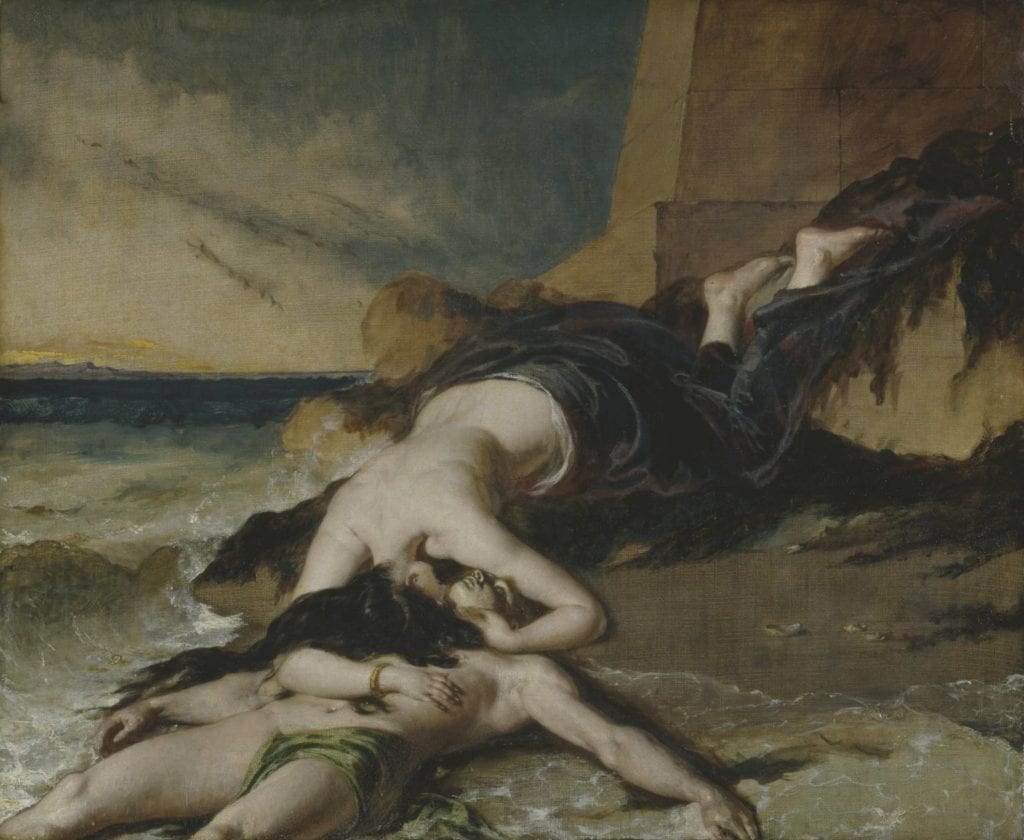‘My soul must follow thee!’ The enduring Greek myth of Hero and Leander
‘My soul must follow thee!’ The enduring Greek myth of Hero and Leander
‘My soul must follow thee!’ The enduring Greek myth of Hero and Leander
-
Hannah
-
Hannah

The Ancient Greeks were a passionate people, as reflected in their colourful, dramatic myths. Love is a common theme in those stories – but so is tragedy.
Last week, I shared with you the myth of the mountain nymph Echo, whose unrequited love for Narcissus caused her to fade away from existence. And I have told you the story that helped to inspire my latest novel, Aphrodite’s Tears: when her mortal lover Adonis died in her arms, Aphrodite’s tears mingled with his blood and created the anemone flower.
Today, I’m sharing a Greek myth that continued to inspire writers and artists many centuries after it was first told. ‘Hero and Leander’ is a simple story of love – and loss.
Hero was a priestess of the cult of Aphrodite, and she lived in a tower in the ancient city of Sestos, Thrace. Her tower overlooked the Dardanelles strait of water in northern Turkey (known in antiquity as the Hellespont), and across that water, in Abydos, Mysia, lived Leander.
Each year, all the young men of Abydos visited the temple of Aphrodite in Sestos for the goddess’s feast day. There, Leander and Hero met, and fell in love. But it was a secret love – Leander’s parents and Hero’s fellow priestesses would not have approved. And so, every night Hero would light a lamp in her tower to act as a beacon in the darkness, and Leander would follow the light as he swam across the Hellespont to be with her, and then swim back before sunrise.
For one heady summer, the two lived for their passionate and secret affair. But then, one night, a storm erupted. Leander could not miss his liaison with his beloved, and so he took to the water as usual. But the water was wild, the waves pushing Leander away from his destination, and the furious wind blew out Hero’s candle so that Leander was lost.
Poor Hero, waiting for her beloved. He did not walk from the waters to take her into his arms, but instead was washed up on the shore at dawn, dead. Heartbroken, Hero threw herself from her tower, and joined her love in the afterlife.
Many painters have depicted aspects of this story. Here is Hero watching anxiously for Leander from her tower:

The Last Watch of Hero, Frederic Leighton, 1880
The painter Rubens brought all of the aspects into one scene: Leander as he dies, surrounded by sea nymphs, and Hero falling to her death.

Hero and Leander, Peter Paul Rubens, c. 1640
My favourite is this painting, by English artist William Etty, which so hauntingly encapsulates Hero’s grief:

Hero, Having Thrown herself from the Tower at the Sight of Leander Drowned, Dies on his Body, by William Etty, 1829
Many writers have been inspired by Hero and Leander too, especially once the Englishman Reverend Francis Fawkes (1720–1777) translated and published the fifth-century Greek poem The Loves of Hero and Leander by Musaeus Grammaticus. The poem ended thus:
Then from the tower her beauteous body cast,
And on her lover’s bosom breath’d her last:
Nor could the Fates this faithful pair divide;
They liv’d united, and united died
Such emotion! No wonder it moved many a writer, from Christopher Marlowe to Shakespeare, John Donne to John Keats. Lord Byron was so taken by the myth that when he was sailing for Constantinople, he made a stop to swim the Hellespont like Leander. He duly wrote a poem entitled ‘Written after Swimming from Sestos to Abydos’, in which he compared his swim for ‘Glory’ and Leander’s for ‘Love’ (it did not end well; Byron wrote: ‘[Leander] lost his labour, I my jest: / For he was drowned, and I’ve the ague’).
I will leave you with my favourite literary interpretation of Hero and Leander’s story, by Alfred, Lord Tennyson, which conveys all of Hero’s passion and need and anguish – and her promise to follow her love wherever he may go.
Hero To Leander
Oh go not yet, my love,
The night is dark and vast;
The white moon is hid in her heaven above,
And the waves climb high and fast.
Oh! kiss me, kiss me, once again,
Lest thy kiss should be the last.
Oh kiss me ere we part;
Grow closer to my heart.
My heart is warmer surely than the bosom of the main.
Oh joy! O bliss of blisses!
My heart of hearts art thou.
Come bathe me with thy kisses,
My eyelids and my brow.
Hark how the wild rain hisses,
And the loud sea roars below.
Thy heart beats through thy rosy limbs
So gladly doth it stir;
Thine eye in drops of gladness swims.
I have bathed thee with the pleasant myrrh;
Thy locks are dripping balm;
Thou shalt not wander hence to-night,
I’ll stay thee with my kisses.
To-night the roaring brine
Will rend thy golden tresses;
The ocean with the morrow light
Will be both blue and calm;
And the billow will embrace thee with a kiss as soft as mine.
No western odours wander
On the black and moaning sea,
And when thou art dead, Leander,
My soul must follow thee!
Oh go not yet, my love
Thy voice is sweet and low;
The deep salt wave breaks in above
Those marble steps below.
The turretstairs are wet
That lead into the sea.
Leander! go not yet.
The pleasant stars have set:
Oh! go not, go not yet,
Or I will follow thee.